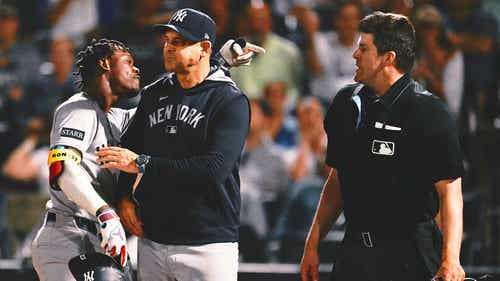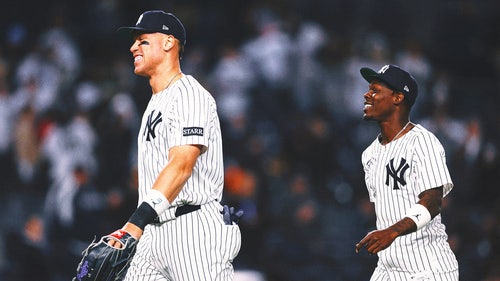
More managers could be on chopping block
Hall of Fame manager Whitey Herzog has a word of advice for aspiring managers.
“Don’t let a star fall on you,’’ he said.
Don Wakamatsu found that out the hard way.
Wakamatsu became the fifth managerial firing of the 2010 season earlier this week, let go by the Seattle Mariners in the midst of only his second year on the job. So much for any good will created by the Mariners’ surprising effort a year ago, Wakamatsu’s first year on the job.
As if unrealistic expectations weren’t a heavy enough burden, Wakamatsu became a victim of the “falling-star syndrome.” His bumbling of the Ken Griffey Jr. situation eroded his clubhouse credibility, which eventually forced the Mariners management to relieve Wakamatsu of his duties.
While Griffey’s on-field skills had faded, he was still the face of the franchise and his clubhouse influence remained, the impact of which became apparent.
There’s no arguing that Griffey no longer was a factor on the field, and it was an issue that needed to be addressed. Dealing with the reality of the situation with a Griffey-type player, however, isn’t like swapping out long relievers or utility infielders.
It’s a team effort, but Wakamatsu decided to go it one on one. He didn’t turn to club president Chuck Armstrong, who has known Griffey since the day he signed his first pro contract with the Mariners, or general manager Jack Zduriencik to discuss how to handle the situation.
How bad did things go? Bad enough that Griffey immediately left Safeco Field, packed up his vehicle and headed home to Florida, not even talking to the folks in the front office until he called from somewhere in Montana to inform them he had decided to call it quits.
And in a season where little has gone right, the lack of respect shown Griffey led to a loss of credibility for Wakamatsu among the players. Things were so bad that Wakamatsu even had a run-in with third baseman Chone Figgins.
ADDING UP
Wakamatsu’s firing came after Arizona dumped A.J. Hinch, Baltimore bid adieu to Dave Trembley, Florida fired Fredi Gonzalez and Kansas City paid off Trey Hillman.
And there was still a third of the season remaining.
Surprised?
Shouldn’t be.
There are more managers whose employment could end any day – including Jerry Manuel with the New York Mets, John Russell in Pittsburgh and Ken Macha in Milwaukee.
It isn’t an abnormal number of in-season changes in the age of expansion, which began in 1961 when the original Washington Senators moved to Minnesota and became the Minnesota Twins and the AL added the expansion Senators in Washington, D.C., and the Angels in Los Angeles.
There were more in-season managerial firings (55) during the 1980s than any other decade in history. The 1970s ranked second with 48. Teams have calmed down the past two decades. There were 36 in-season firings in both the 1990s and 2000s. There were only 24 in-season changes in the 1950s, the decade before baseball began a massive overhaul that began with expansion and has included the addition of the designated hitter, realignment and wild cards, along with the creation of a players association that is easily the strongest in sports.
The ’70s and ’80s were when baseball first had to deal with the free agency of players, and the resulting in-season work stoppages that haunted the game for the better part of two decades. With finances rising, owners became more aware of fan grousing and were more easily convinced to make the knee-jerk move of firing a manager.
In 30 of the past 60 years there were six or more in-season changes, including a record nine in 1991 and eight in both 1972 and 1988.
STABILITY
The Dodgers have been the most patient team. They have made only two in-season changes in the past 60 years – Bill Russell replacing Tom Lasorda 77 games into the 1996 season and Russell being replaced by Glenn Hoffman 74 games into the 1998 season.
There were no in-season changes in 2000 and 2006, the first two seasons of tranquility since 1956.
WHAT GIVES
Trembley and Hillman were victims of bad teams continuing to be bad. Gonzalez was the victim of an owner who is so out of touch with reality that he actually thought the Marlins should be able to win the NL East. And Hinch was a victim of a harebrained idea of former Arizona general manager Josh Byrnes, who put his first lieutenant, Hinch, in uniform in the dugout even though Hinch had never coached nor managed before in his life.
DECISION TIME
Bobby Cox with Atlanta, Lou Piniella with the Cubs and Cito Gaston with Toronto already have announced they will retire at season’s end. Joe Torre of the Dodgers has hinted he also will be ready to move off after this season.
Cincinnati manager Dusty Baker is in the final year of his contract, but sources have indicated Baker will return, although both Baker and management want to avoid negotiations on a new deal becoming a distraction for the Reds in their postseason bid.
WHO’S NEXT
All indications are Gonzalez will land on his feet, replacing Cox in Atlanta.
It’s going to be hard for the Cubs to ignore Hall of Fame second baseman Ryne Sandberg, who was told if he wanted to be a manager in the big leagues he needed to get experience in the minors, and he’s in his fourth year of doing just that in the Cubs system. Torre and former big-league managers Bob Brenly and Bobby Valentine have let it be known they’d have interest in the job. There’s even talk of Yankee manager Joe Girardi, a former Cubs catcher who attended Northwestern and grew up in Peoria, Ill.
Gaston has put in a good word for former Cubs/Rockies manager Don Baylor as his replacement in Toronto. San Diego bench coach Ted Simmons has been mentioned in Florida, but will be a prime candidate in Seattle. Simmons was the general manager in Pittsburgh who gave Zduriencik his first scouting director’s job.
Two sleepers in the managerial sweepstakes are coaches Pete Mackanin of Philadelphia and Tom Runnells of Colorado.








